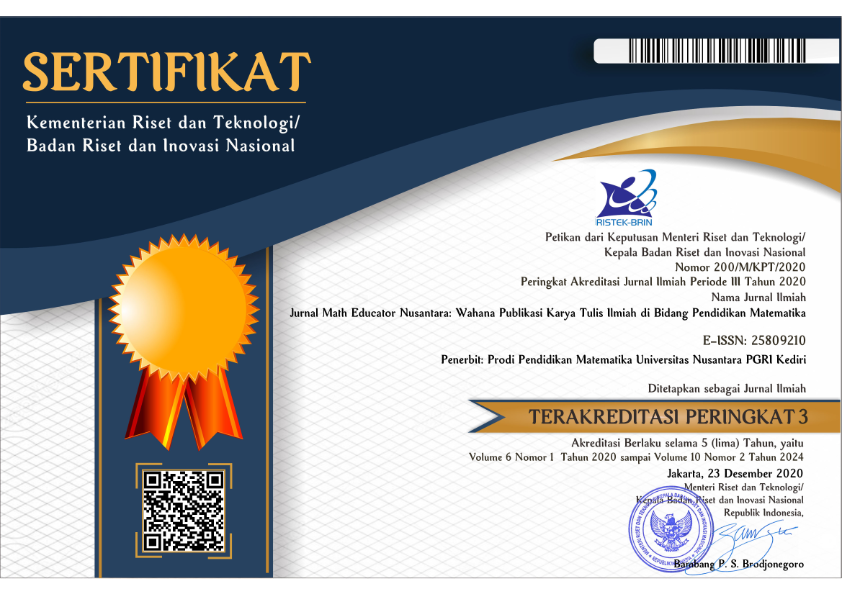The influence of mathematics anxiety and emotional quotient on English language education students’ statistics learning outcomes
DOI:
https://doi.org/10.29407/jmen.v6i2.14836Keywords:
Mathematics Anxiety, Emotional Quotient, statistics learning outcomesAbstract
The internal factors (characteristics) of students are assumed to have an impact on the learning process. Internal factors of students include motivation, creativity, intelligence, emotional intelligence, anxiety, etc. Most English language education students still worry about statistics course, which contains numbers and different calculation process types. However, the ‘statistics’ course is a compulsory subject that students must study, particularly at IKIP PGRI Bojonegoro, which is very useful to complete final and daily assignments. Statistics is a part of mathematics that studies how to access, analyze, and interpret data. Most English language education students find numbers-related topics difficult. Anxiety in subjects related to numbers is assumed to affect students' psychological state, especially emotional states, which is an important factor that leads to achievement. This study aimed to determine the effect of mathematics anxiety and emotional quotient on English language education students' statistics learning outcomes at IKIP PGRI Bojonegoro. The subjects in this study were the third-year students of English language education in 2019/2020. The technique of data analysis used was the Multiple Regression Analysis. The data were obtained from questionnaires and documentation. The results showed that mathematical anxiety and emotional quotient affect English Language Education students' statistics learning outcomes at IKIP PGRI Bojonegoro. This is evidenced by the value of Fcount = 69,992 higher than Ftable = 1,607. Mathematical anxiety and emotional quotient affect the statistics learning outcomes by 74.9% (strong category).
Faktor internal (karakteristik) mahasiswa diduga dapat mempengaruhi proses pembelajaran yang dilakukan. Ada banyak faktor internal (karakteristik) mahasiswa diantaranya motivasi, kreatifitas, kecerdasan spiritual, kecerdasan emosi, kecemasan, dan lain-lain. Sebagian besar mahasiswa prodi pendidikan bahasa inggris masih merasa cemas dengan mata kuliah statistika yang banyak mengandung angka dan berbagai macam proses penghitungan. Padahal statistika wajib dipelajari oleh setiap mahasiswa khususnya di IKIP PGRI Bojonegoro karena merupakan mata kuliah wajib yang sangat bermanfaat dalam penyelesaian penulisan tugas akhir maupun kehidupan sehari-hari. Statistika merupakan bagian dari ilmu matematika yang mempelajari tentang cara memperoleh, menganalisis, dan menginterpretasikan data. Mahasiswa menganggap mata kuliah yang berhubungan dengan angka selalu sulit. Perasaan cemas pada mata kuliah yang berhubungan dengan angka tersebut diduga dapat memengaruhi kondisi psikis mahasiswa khususnya ranah emosi, padahal emosi merupakan faktor penting yang dapat mempengaruhi prestasi seseorang. Dari penjelasan tersebut tujuan dari penelitian ini adalah untuk mengetahui pengaruh mathematic anxiety dan emotional quotient terhadap hasil belajar statistika mahasiswa Pendidikan Bahasa Inggris IKIP PGRI Bojonegoro. Subjek pada penelitian ini adalah mahasiswa tingkat III tahun akademik 2019/2020. Teknik analisis data menggunakan Analisis Regresi Ganda. Data diperoleh melalui kuesioner dan dokumentasi. Hasil penelitian menunjukkan mathematic anxiety dan emotional quotient memengaruhi hasil belajar statistika mahasiswa Pendidikan Bahasa Inggris IKIP PGRI BOJONEGORO. Hal ini dibuktikan dengan nilai Fhitung = 69,992 lebih besar daripada Ftabel=1,607. Mathematic Anxiety dan emotional quotient memengaruhi hasil belajar statsitika mahasiswa pendidikan bahasa inggris sebesar 74,9%. Pengaruh mathematic anxiety dan emotional quotient sebesar 74,9% masuk dalam kategori kuat.
References
Ali, M., Sukoco, M., & Suaedi, F. (2018). Effect of Emotional Intelligence, Commitment, and Motivation Towards Lecturer Performance. IJEBD (International Journal Of Entrepreneurship And Business Development), 1(2), 202–209. https://doi.org/10.29138/ijebd.v1i2.565
Budiyono. (2011). Penilaian Hasil Belajar.Surakarta: UNS
Dewi, D. S. (2020). The correlation between students’study anxiety and students’reading comprehension. ANGLO-SAXON: Jurnal Ilmiah Program Studi Pendidikan Bahasa Inggris, 11(1), 81-90.
Fauziah, F. (2015). Hubungan Kecerdasan Emosional Dengan Prestasi Belajar Mahasiswa Semester Ii Bimbingan Konseling UIN Ar-Raniry. JURNAL EDUKASI: Jurnal Bimbingan Konseling, 1(1), 90. https://doi.org/10.22373/je.v1i1.320
Fitriza, R. (2020). Pengaruh kecemasan matematika ( mathematics anxiety ) terhadap kemampuan pemecahan masalah peserta didik kelas VII MTs. 4(1), 103–113.
Husnul Q. (2016). Pengaruh Kecemasan Matematika (Math Anxiaety) Terhadap Hasil Belajar Matematika Siswa Kelas X Sma Negeri 11 Banda Aceh. Skripsi: UIN Ar Raniry Darussalam-Banda Aceh
Idris, R. (2013). MaPan : jurnal matematika dan pembelajaran. MaPan : Jurnal Matematika Dan Pembelajaran, 1(1), 135–150. http://journal.uin-alauddin.ac.id/index.php/Mapan/article/view/1133
Islam, U., & Alauddin, N. (2019). Building Students ’ Emotional Quotient through Religion Teaching in Public Higher Institution. 3(1), 56–72.
Istikomah, E., & Wahyuni, A. (2018). Student’s Mathematics Anxiety on The Use of Technology in Mathematics Learning. JRAMathEdu (Journal of Research and Advances in Mathematics Education), 3(2), 69. https://doi.org/10.23917/jramathedu.v3i2.6364
M., P., & S. Z., K. (2016). Mathematics Anxiety and Its Relationship with the Achievement of Secondary Students in Malaysia. International Journal of Social Science and Humanity, 6(2), 119–122. https://doi.org/10.7763/ijssh.2016.v6.630
Omar, S. N. Z., Bakar, A. A., Husin, F. M., & Mohamad, M. (2019). Teachers’ job performance: the relationship between intellectual, emotional and spiritual quotients. Journal of Advanced Research in Dynamical and Control Systems, 11(5 Special Issue), 1095–1099.
Pamungkas, A. S., Pendidikan, J., Universitas, M., Ageng, S., Matematika, K., & Belajar, H. (2014). Kontribusi Self Concept Matematis Dan Mathematics.
Pasaribu, S., Zahreni, D. S., & Hasnida. (2018). The Influence of Spiritual Quotient and Emotional Quotient to Internal Audit Judgment. International Research Journal of Advanced Engineering and Science, 3(2), 218–221.
Purwati, & Hasanah. (2016). Deskripsi Pengaruh Kecerdasan Emosional terhadap Prestasi Belajar Mahasiswa Pendidikan Matematika UNIPA. Pancaran, 5(4), 169–178.
Rahmatullah, N., & Irianto, G. (2018). The Effects Of Intellegence Quotient , Emotional Quotient , And Spritual Quotient On The Tendency Of Accounting Fraud. 7(9), 212–216.
Rawa, N. R., & Mastika Yasa, P. A. E. (2019). Kecemasan Matematika Pada Mahasiswa Pendidikan Guru Sekolah Dasar. Journal of Education Technology, 2(2), 36. https://doi.org/10.23887/jet.v2i2.16180
Setiadi, Y. (2018). Hubungan Konsep Diri, Kecerdasan Emosional, dan Kecemasan Belajar dengan Prestasi Belajar Mahasiswa. JNPM (Jurnal Nasional Pendidikan Matematika), 2(1), 119. https://doi.org/10.33603/jnpm.v2i1.1066
Setiyawan. (2013). Tingkat Kecerdasan Emosional Siswa Yang Mengikuti Ekstrakurikuler Olahraga dan Yang Tidak Mengikuti Ekstrakurikuler Olahraga di SMK PGRI Sentolo. Skripsi: UNY
Udil, P. A., Kusmayadi, T. A., & Riyadi, R. (2017). Metacognition Process of Students with High Mathematics Anxiety in Mathematics Problem-Solving. International Journal of Science and Applied Science: Conference Series, 2(1), 261. https://doi.org/10.20961/ijsascs.v2i1.16724
Uin, P., Murnianti, D., & Khairani, M. (2017). Nurafni, dkk. Kecerdasan Emosional Siswa Sekolah Dasar (SDN) Dengan Siswa Sekolah Dasar Islam Terpadu ( SDIT ) Di Kota Banda Aceh, 3(1), 33–44.
Yuberta, K. R., Setiawati, W., & Kurnia, L. (2019). Pengaruh Math Anxiety Terhadap Kemampuan Pemahaman Konsep Matematis Siswa. AGENDA: Jurnal Analisis Gender Dan Agama, 2(1), 81–87.
Downloads
Published
Issue
Section
License
Authors who publish with this journal agree to the following terms:
- Copyright on any article is retained by the author(s).
- The author grants the journal, the right of first publication with the work simultaneously licensed under a Creative Commons Attribution License that allows others to share the work with an acknowledgment of the work’s authorship and initial publication in this journal.
- Authors are able to enter into separate, additional contractual arrangements for the non-exclusive distribution of the journal’s published version of the work (e.g., post it to an institutional repository or publish it in a book), with an acknowledgment of its initial publication in this journal.
- Authors are permitted and encouraged to post their work online (e.g., in institutional repositories or on their website) prior to and during the submission process, as it can lead to productive exchanges, as well as earlier and greater citation of published work.
- The article and any associated published material is distributed under the Creative Commons Attribution-ShareAlike 4.0 International License














